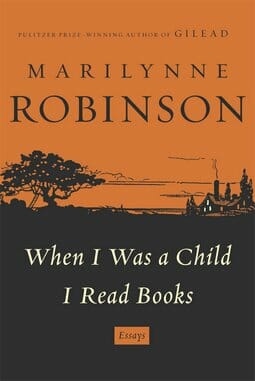When I Was A Child I Read Books by Marilynne Robinson
The War Between Nonsense and Common Sense

When it comes to the pleasures of reading, my tastes grow increasingly promiscuous. My favorite books of the past few years include a father’s outrageous tales of life with his four young sons (Somewhere More Holy, Tony Woodlief); an undertaker’s everyday dealings with dead bodies (The Undertaking, Thomas Lynch); a history of Google (Googled: The End Of The World As We Know It, Ken Auletta); the account of an obsessed lumberjack and an exotic spruce tree in British Columbia (The Golden Spruce, John Vaillant); Jay-Z’s autobiography (Decoded); an anthropological history of modern advertising (The Age of Persuasion, Terry O’Reilly); and David Foster Wallace’s Consider The Lobster, with an essay about tennis that was so bloody good it made me feel like a bona fide tennis fan, despite the fact that I’ve never actually watched a tennis match in my whole life.
If my enjoyment as a reader is broad, my admiration and respect for writers is more measured, saved for those who display that rare human quality: wisdom.
Wise writers help me find my way in the world. They do not deny broad swaths of the daily news in order to protect their ideological or political commitments, or shut out terrible details of history to make the world fit their rubric. They deepen my sense of wonder at the inescapable complexity and mystery of the universe and lead me in that great, perennial human challenge:
How to live well.
With her newest book of essays, When I Was A Child I Read Books, Marilynne Robinson affirms that my deep admiration and respect for her are well-placed. “Every great question is very old,” she writes, and here, as has been the case throughout her career as a writer, the great questions concern her most. Robinson displays an exceptional gift for deciphering the zeitgeist and offering generous counsel. Her reflections on the great questions follow Karl Barth’s advice to preach with The New York Times in one hand, and the Bible in the other. Not only is her book wise; it is full to the brim with clear, resonant, melodic prose.
These essays do two things very well. First, they provide a clear, largely unflattering diagnosis of America. Like Wendell Berry, another wise, fierce national critic, Robinson soundly criticizes her country because she loves it and genuinely believes it’s worth defending against the widespread cultural degradation fostered by “hysterical scientism,” modern economics, and populist politics.
“Our civilization has recently chosen to identify itself with a wildly oversimple model of human nature and behavior,” she says, the overall effect being “a drift toward cynicism and away from mutual respect and from willingness to take responsibility for our life as a community and a culture.” Robinson offers an unapologetically Christian response to the problem, but by no means does her adherence to religious tradition blind her to the deliberate myopia of populist Christianity. “The return to traditional values seems…to mean, together with a bracing and punitive severity toward the vulnerable among us, the establishment of a religious monoculture we have never had and our institutions never encouraged.” She is as scornful of cheap so-called democracy as of cheap so-called faith.
Second, her essays affirm the extraordinary meaningfulness of words. Maybe it’s not surprising that an Orange Prize and Pulitzer Prize-winning novelist, essayist and writing instructor (Robinson teaches at the prestigious Iowa Writer’s Workshop) would want to defend the idea that words meaning something, but by doing so she swims directly against the current intellectual tide. Postmodern culture tells us meaning is ephemeral, subjective, open to endless interpretation, and elusive, and that images carry more weight than words. Robinson doesn’t argue directly with the proponents of postmodern critical theory, but every page affirms that we live by the words we use, that our language and metaphors are no mere semantic games or matters of idiosyncratic interpretation. How we speak defines how we live.
Her deepest concern lies in words centered on our response to this question: “What is a human being.”
“I am persuaded,” she says, “that we educate ourselves and one another to think in terms that are demeaning to us all.” The grand narratives of human origins and our place in the cosmos “seem to have been dismissed together with metaphysics as meaningless,” she writes. “The theories of human nature that have developed in the modern period attempt to fold us into great nature by making human complexity accidental.”
When science claimed to have supplanted the religious explanation of who we are and how we got here, the biologist’s diagram replaced the priest’s blessing. The scientist’s sermons define the human as nothing more than a sneeze of stardust, a random product of blind, evolutionary chance in a vast, cold, utterly indifferent universe. No longer do we think of ourselves as created. We’re simply weird flukes.
-

-

-

-

-

-

-

-

-

-

-

-

-

-

-

-

-

-

-

-

-

-

-

-

-

-

-

-

-

-

-

-

-

-

-

-

-

-

-

-








































